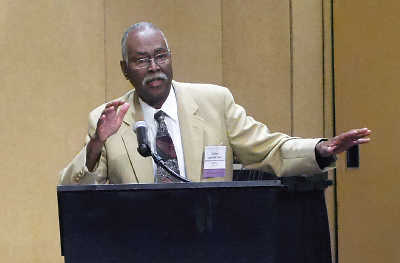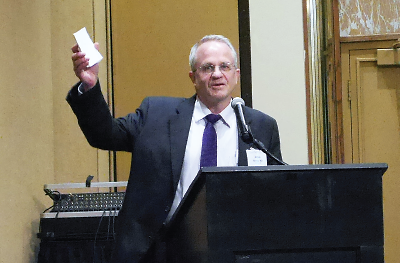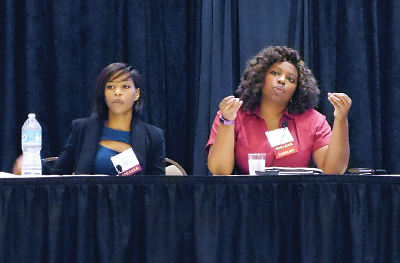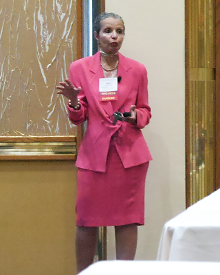An individual’s emotional responses are often rooted in the historical events and experiences of his or her culture, some mental health experts say in speaking about the civil unrest in African-American communities where unarmed African-American males have died at the hands of law enforcement.
This was the takeaway message from a recent conference led by the Missouri Psychiatric Association, which gave psychiatrists, psychologists, and other mental health professionals an opportunity to engage in a dialogue on some of the underlying psychosocial factors that may have resulted in uprisings in multiple cities across the United States in the past few years related to race, socioeconomic disadvantages, and discriminatory practices of some municipal criminal justice systems.
“Everybody remembers August of last year in Ferguson, Mo., which was at the center of national and international news after the shooting death of Michael Brown,” James Fleming, M.D., told Psychiatric News. Fleming, a psychiatrist at Holistic Psychiatry Kansas City, Mo., was one of the moderators of the conference, “Addressing the Psychiatric Impact of Economic Disparity, Societal Stress, and Racial Profiling,” which was held in Columbia, Mo., less than two hours from Ferguson.
Brown was an unarmed 18-year-old African American who was shot on August 9, 2014, by Darren Wilson, 28, a white on-duty Ferguson police officer, during an altercation between the two men. A series of protests and civil disorder erupted in the city shortly after the shooting, sparking a national dialogue about race and the relationship between law enforcement officers and African Americans, in particular those African Americans living in impoverished areas.
“We know that the economic conditions and racial inequalities in the inner city have been very poor for many years,” said Fleming. “This has clearly had an adverse impact on the African-American community as witnessed in such places as Baltimore and New York.”
In response to the series of shootings of unarmed African-American males and civil unrest throughout the nation, the Black Caucus of the APA Assembly passed an action paper last spring calling for the education of APA members about the need to provide community-based and culturally sensitive mental health services to those who may have been affected by these events. The current meeting was inspired by that mission and focused heavily on cultural history.
“Past circumstances perpetuate today’s issues,” said Marva Robinson, Psy.D., a clinical psychologist and president of the St. Louis Association of Black Psychologists, as she explained to conference attendees how historical trauma has had an impact on many African-American communities.
“Looking over the past 400 years that African Americans have been in this country, we have been enslaved both physically and psychologically,” said Robinson. She told Psychiatric News that psychological enslavement persisted after slavery was made illegal in the United States: African Americans were denied voting rights, first-class education, access to certain establishments, and opportunities available to whites, and they were the victims of violence and hatred and many forms of overt and covert discrimination.
“Any form of enslavement sends the message that you are not an individual and that your life is not important,” Robinson explained.
According to an ongoing study by Robinson, historical trauma that is linked to racism is associated with numerous physiological and psychological outcomes. These outcomes include low volumes in the prefrontal cortex, hippocampus, and the amygdala (areas related to memory and emotions); and increased risk for diabetes and hypertension. Psychological outcomes include increased risk of posttraumatic stress disorder, oppositional defiant disorder, attention-deficit/hyperactivity disorder, depression, and aggression. The data also show that people who are subjected to some forms of racism are more willing to engage in criminal behaviors.
Economic disparity also can play a role in psychological and physiological distress, said Deanna Barch, Ph.D., chair of the Department of Psychology at Washington University. She presented data from the Preschool Depression Study, which measured the neurobiological and psychological effects of poverty on 246 preschool-aged children up to their teenage years. “Poverty has a clear effect on the development of brain structure and brain function,” Barch told Psychiatric News.
“Looking at MRI scans, impoverished children showed a steeper decline in gray mater volume over the course of the study compared with children who were not impoverished,” explained Barch. Poverty-related stress was also negatively associated with children’s hippocampal volume and functional brain activity. In addition, poverty was associated with the onset of childhood depression.
According to Amina Avion, a graduate student at the Early Emotional Development Program at Washington University, many African Americans in Ferguson are affected by both racism and poverty. The unemployment rate for African Americans living in the city is 20 percent compared with 7 percent for whites. Though the city is 67 percent African American and 29 percent white, there is very little representation of African Americans in leading positions within the local government—including the police force, which is 11 percent African American and 83 percent white.
In an investigative report released this year by the U.S. Department of Justice, the Ferguson Municipal Court system was found to have disproportionately targeted African-American citizens—through citations and arrests—for financial gain for the city from 2012 to 2014. Within that period, African Americans accounted for 93 percent of arrests made by Ferguson police and were 68 percent less likely to have their cases dismissed than were whites.
“Those of us who have studied issues of race and inequality—and, in particular, African-American relations with law enforcement, could have predicted that an uprising in Ferguson was soon to happen,” Karen Curls, Ph.D., chair of the Social Sciences Division at the Metropolitan Community College Penn Valley Campus, told Psychiatric News.
Curls, who was one of the conference speakers, said that policing and its racial and social construct date back to the 1700s with slave patrols and night watchers. These were white men who were hired by slave owners to monitor the behavior of blacks and maintain social and economic order.
“This resulted in setting a foundation and a belief as they relate to groups of people in this country,” said Curls, “which was to protect whites and control and criminalize blacks.” To reverse this belief system, this country’s history of racism, race relations, and the criminal justice system must be addressed, she emphasized.
Speaking with Psychiatric News after the conference, Fleming said that on the basis of attendees’ evaluations of the conference, he is hopeful that participants will better understand the plight of many African Americans.
“There was an appreciation of the knowledge base of historical roots of racism in this country, the impact of institutionalized racism, and various aspects of mental health among minority communities,” said Fleming. “For many of us in attendance, this was new information and will allow us, as mental health professionals, to be more culturally sensitive to all patients. We hope to continue this dialogue in future programs.” ■




